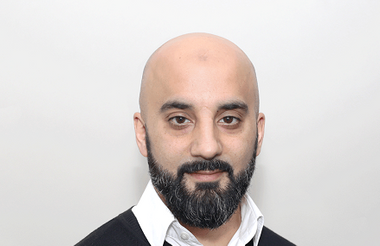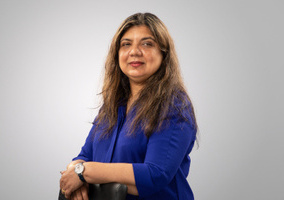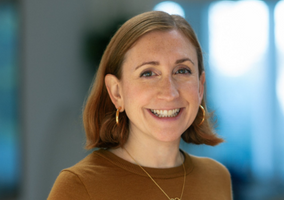Islamic Relief Worldwide’s UK director Tufail Hussain has helped to lead the charity through a number of international aid emergencies since assuming the role in 2019, including the recent earthquake in Morocco and floods in Libya, to which the charity is currently responding.
He joined Islamic Relief as a deputy director in 2016, but has worked in the charity sector for 18 years, including as CEO of Orphans in Need.
He is also a trustee of the Muslim Charities Forum and a director of TIC International.
Hussain, who was also interim CEO of Islamic Relief in 2021, says he finds the generosity of the charity’s donors “incredible”, with its income almost doubling over the past five years to £234m in 2022.
‘This community keeps giving’
Hussain says faith motivates the community to keep giving, and attributes this to the rise in the charity’s income.
However, he says the charity’s donors, most of whom are Muslim, have been impacted by “the current economic state of our communities”.
“The community is so compassionate and generous. Fundamental to our faith is helping those that are in need,” he says.
“I’ve worked in the sector now for 18 years and I have never seen donor fatigue in our community. Whenever there has been a crisis this community has generously stepped forward and answered the call and responded by donating, really, above their own means – it is incredible to behold.”
“It’s something entrenched in our faith, we are taught from a young age to look out for others and to help when called upon, and that is why this community keeps giving.”
The charity receives two forms of donation from Muslim supporters driven by their faith – Zakat and Sadaqah.
Zakat is a compulsory form of giving, whereby 2.5% of a person’s annual savings has to be given to charitable causes.
Sadaqah, meanwhile, is non-compulsory giving, whereby Muslim donors can give as much or little as they wish. And again, this just is a marker of the generosity of the community,
“For us, we probably raise three times more Sadaqah than we do Zakat,” says Hussain.
‘An increasingly Islamophobic environment’
Fadi Itani, chair of the Muslim Charities Forum, has long been raising the issue of Muslim charities not being able to access banking services. When asked about Islamic Relief’s experience, Hussain says the charity faces similar additional scrutiny.
“We’re operating in an increasingly Islamophobic environment and if you have a Muslim name then unfortunately, life is made more difficult for you and we have to abide by higher standards, it seems.
“The positive is that we have become this rules-rich organisation to ensure that we don’t fall foul of any sort of challenges or rules.
“But the flip side is, it does get a bit draining that you have to work harder to send money into a country where millions are suffering, and we have to do extra due diligence to ensure that we are able to send funds into a place like Syria or Gaza or even Somalia.”
Hussain says there is a mistaken view that Islamic Relief “are only for Muslims” and the charity to “circumvent those misconceptions through the example of our work”.
“We are an organisation for all people, of all faiths, and none. And we’ve proven that time and time again.”
Morocco and Libya: ‘The general emergency fund allows us to be agile’
The charity has responded to numerous natural disasters in the past few years, most recently in Morocco and Libya.
“Despite giving so much, time and time again, in such a short space of time, the response to both Morocco and Libya has been absolutely incredible,” says Hussain.
“One of our strengths is that we go off the beaten track. We understand the local community and go to parts where other organisations may find it difficult to go to, or haven’t thought of.”
Islamic Relief launched a £10m emergency appeal to provide aid to survivors of the earthquake in Morocco.
Responding has had its difficulties because it is a country where the charity did not have an office, and also, the area that was affected in the Atlas Mountains is quite remote.
“When we found out the scale of the earthquake, we immediately mobilised our rapid response team and we had people on the ground.”
Islamic Relief met up with the Moroccan Red Crescent and started to coordinate with them.
“UN agencies usually organise cluster meetings in such humanitarian situations. We’re well plugged into the humanitarian system, so we immediately coordinate with them and ensure that our work is coordinated with other agencies.”
“You’ve got villages that have been wiped off the face of the map. We went to one village where nearly 60% of the village population had been killed. Whole families have died, leaving in some cases just one child or a mother has survived.
“There right now it's a race against time. It’s up in the mountainous regions and during the winter months, it's extremely cold up there and people are out on the streets.”
For the flooding in Libya, the charity immediately allocated £1m from its general emergency fund, which Hussain says “allows us to be agile, and to respond so we don’t have to wait for funds to come in”.
“Libya hasn’t had the level of coverage of Morocco, but from what I can ascertain, and from what our teams are telling us on the ground, it is a huge crisis – absolutely huge.”
“The culture there is that families live together, they build on top of houses. Whole generations of families have been lost to that crisis. The world needs to speak up more about it.
“It is an area that’s already been suffering because of the political instability in Libya, but we cannot forget the people of Libya at this time and we need to do whatever we can.”
Hussain says the charity will be in Libya and Morocco “for as long as it takes” and that Islamic Relief usually stays beyond the main crisis, and looks to deliver programmes, but “it all depends on the situation, the countries handling it, what the needs are”.
Covid: ‘That was a crisis moment’
The coronavirus pandemic presented a particular challenge for Muslim charities as the first UK lockdown was announced a couple of weeks before Ramadan, the month of giving.
Hussain says 40% of its annual income is raised during the Ramadan campaign, so the charity had to act swiftly, “because we worked so hard on the Ramadan campaign, you start working the year before and then start putting everything in place.”
When the pandemic first hit and lockdown had not been announced, the charity “had to make a decision quickly” because a lot of its activities involved outdoor activities, collections and events.
“Much of our campaign needed us to be out there in the community,” says Hussain.
“We took a decision. We thought that there was going to be a lockdown so we decided very early to pivot our campaign. And so, we cancelled everything outdoors, all of our outdoor advertising, our events.
“And we reinvested that money into online digital platforms, digital mediums, and a week later a lockdown was announced and we were so thankful that we were able to make that decision because that Ramadan we raised a record amount of money.
“So, that was a crisis moment and I think during a crisis, leadership has to be in control and sometimes you do not have all the information. So, it is a bit intense, but thankfully, we made the right decision at the time.
“Consulting is important, and I certainly did that with my senior management team. From that moment we have grown.”
Related Articles












